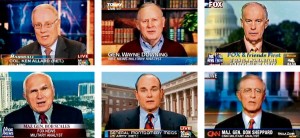 Salon has a pretty digestible write-up about the conflict of interest between TV military experts (“retired generals” and such) who are shown to viewers as neutral advisors while privately profiting greatly from their promotion of pro-war ideals. David Barstow won a Pulitzer for his reporting of this story, although his work has been largely ignored by the “news” organizations that employ these advisors as on-air experts.
Salon has a pretty digestible write-up about the conflict of interest between TV military experts (“retired generals” and such) who are shown to viewers as neutral advisors while privately profiting greatly from their promotion of pro-war ideals. David Barstow won a Pulitzer for his reporting of this story, although his work has been largely ignored by the “news” organizations that employ these advisors as on-air experts.
I was just at a local college, talking to a class about propaganda within the U.S. news media, and it’s really a beautifully complex thing. The average U.S. television viewer has hundreds of channels at his disposal, dozens of which are news-oriented, yet they all seem to focus on the same stories, highlight the same aspects of these stories, push the same agendas, even use the same phrasing. The Daily Show does great montages of this, especially after political debates or State of the Union addresses, where every network can be magically seen to be using the same semi-clever puns and framework to examine the issues put forth. So how is this? I mean, in Stalinist Czechoslovakia you might have expected state-run television, and official media talking points that seem to be little deviated from, but in America, with some of the most liberal free speech laws in the world, what gives?
I don’t want to make this too long of a post, so I’ll just say that I think the dominant factor involved is the “meritocracy” (which actually operates more like a plutocracy) that is the media. Those who ask unpopular questions, questions that challenge power, and soon ousted from corporate media. Those who ask questions that flatter power are soon promoted. It’s a selectional pressure that leads to the evolution of a plutocratic and homogeneous media environment. Chomsky has done an inhuman amount of study of this subject, and his work speaks to the issue better than I ever could. Grab a copy of Manufacturing Consent, or watch it on Youtube (50 minutes version | 2.5 hr version).
As a quick thought experiment, let me present the idea of military films. In America, theoretically one can make any film one wants about the military. It can glorify, it can vilify, it can remain neutral. The military has a “film liaison unit” that is responsible for reading and approving every word of every script. If you want military consultants, military planes, military boats, military aircraft carriers, military tanks, and so on, they must approve your script. If your script is approved, whatever you desire is basically free (except for fuel costs). If they reject your script, and it calls for a stealth bomber, good luck shooting your film. So with this sort of tacit selectional pressure it’s not hard to imagine how the vast majority of military films could end up pro-military. A balanced viewpoint is not presented. When Top Gun came out there were Navy recruiting booths in the theaters. You can’t get much more propagandic than that.
Lastly, let’s look at Act of Valor, a $20M budget war film starring Navy SEALS. It came out last weekend, earning $24.5M in its first two days. What’s significant about Act of Valor is that it actually started as a Navy SEALS recruiting commercial and then grew into a film. It starts actual SEALS whose names have been redacted. The line between soft propaganda and hard propaganda gets a little more blurry, and the role of the media entertainment industry in propaganda becomes strikingly clear.
For more on asking questions and deviating from endorsable and power-friendly viewpoints, checkout Jeff Choen’s book (Cable News Confidential), AR talk, or short Democracy Now! interview. He points out how he was a producer of Donahue when it was MSNBC’s best rated show, sometimes airing anti-war viewpoints, and three weeks before the invasion of Iraq, at the height of its ratings, the show was summarily canceled. An internal MSNBC memo was later leaked, a memo that said “Donahue represents a difficult public face for NBC in a time of war. He seems to delight in presenting guests who are antiwar, anti-Bush and skeptical of the administration’s motives.” The last few months the show was aired, for every left-wing guest they were required to have two right-wing guests. When the producers suggested booking Michael Moore, they were told they would need THREE right-wing guests to offset his views. Make no mistake: MSNBC, ABC, CBS, Fox News, they are all different shades of the same product.